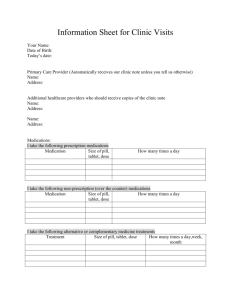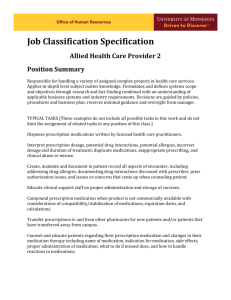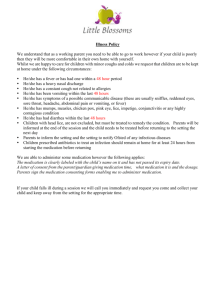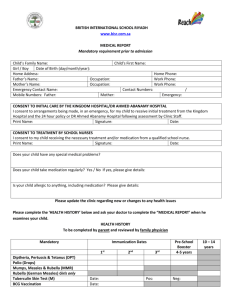Health Program Section of Student Handbook
advertisement
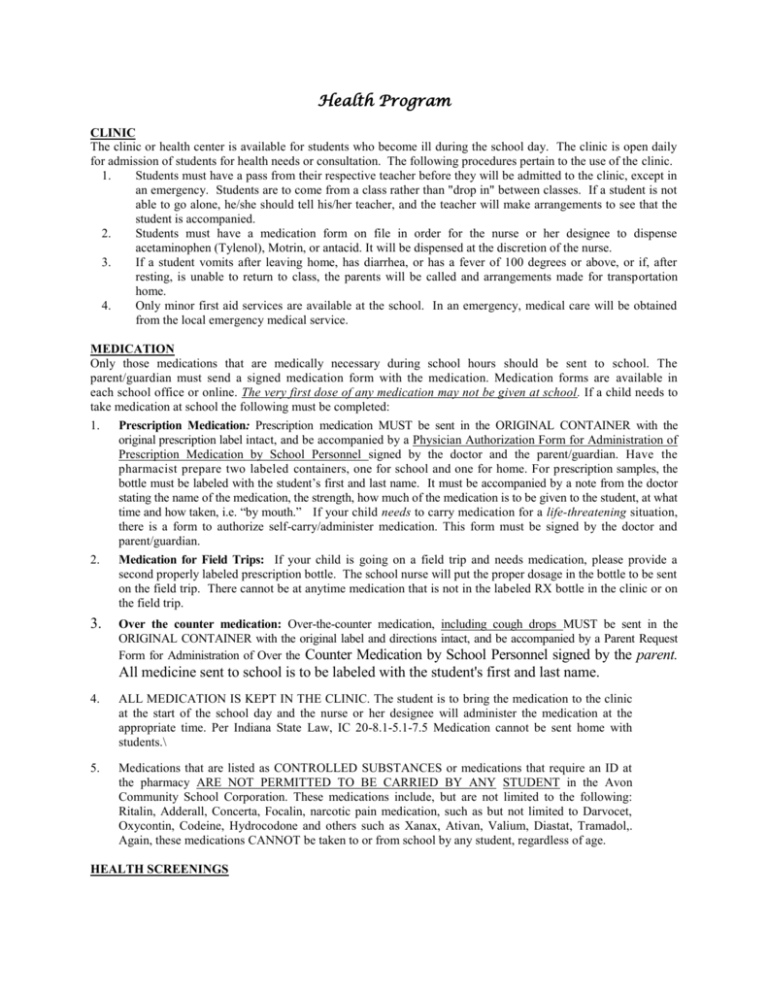
Health Program CLINIC The clinic or health center is available for students who become ill during the school day. The clinic is open daily for admission of students for health needs or consultation. The following procedures pertain to the use of the clinic. 1. Students must have a pass from their respective teacher before they will be admitted to the clinic, except in an emergency. Students are to come from a class rather than "drop in" between classes. If a student is not able to go alone, he/she should tell his/her teacher, and the teacher will make arrangements to see that the student is accompanied. 2. Students must have a medication form on file in order for the nurse or her designee to dispense acetaminophen (Tylenol), Motrin, or antacid. It will be dispensed at the discretion of the nurse. 3. If a student vomits after leaving home, has diarrhea, or has a fever of 100 degrees or above, or if, after resting, is unable to return to class, the parents will be called and arrangements made for transportation home. 4. Only minor first aid services are available at the school. In an emergency, medical care will be obtained from the local emergency medical service. MEDICATION Only those medications that are medically necessary during school hours should be sent to school. The parent/guardian must send a signed medication form with the medication. Medication forms are available in each school office or online. The very first dose of any medication may not be given at school. If a child needs to take medication at school the following must be completed: 1. Prescription Medication: Prescription medication MUST be sent in the ORIGINAL CONTAINER with the original prescription label intact, and be accompanied by a Physician Authorization Form for Administration of Prescription Medication by School Personnel signed by the doctor and the parent/guardian. Have the pharmacist prepare two labeled containers, one for school and one for home. For prescription samples, the bottle must be labeled with the student’s first and last name. It must be accompanied by a note from the doctor stating the name of the medication, the strength, how much of the medication is to be given to the student, at what time and how taken, i.e. “by mouth.” If your child needs to carry medication for a life-threatening situation, there is a form to authorize self-carry/administer medication. This form must be signed by the doctor and parent/guardian. 2. Medication for Field Trips: If your child is going on a field trip and needs medication, please provide a second properly labeled prescription bottle. The school nurse will put the proper dosage in the bottle to be sent on the field trip. There cannot be at anytime medication that is not in the labeled RX bottle in the clinic or on the field trip. 3. Over the counter medication: Over-the-counter medication, including cough drops MUST be sent in the ORIGINAL CONTAINER with the original label and directions intact, and be accompanied by a Parent Request Form for Administration of Over the Counter Medication by School Personnel signed by the parent. All medicine sent to school is to be labeled with the student's first and last name. 4. ALL MEDICATION IS KEPT IN THE CLINIC. The student is to bring the medication to the clinic at the start of the school day and the nurse or her designee will administer the medication at the appropriate time. Per Indiana State Law, IC 20-8.1-5.1-7.5 Medication cannot be sent home with students.\ 5. Medications that are listed as CONTROLLED SUBSTANCES or medications that require an ID at the pharmacy ARE NOT PERMITTED TO BE CARRIED BY ANY STUDENT in the Avon Community School Corporation. These medications include, but are not limited to the following: Ritalin, Adderall, Concerta, Focalin, narcotic pain medication, such as but not limited to Darvocet, Oxycontin, Codeine, Hydrocodone and others such as Xanax, Ativan, Valium, Diastat, Tramadol,. Again, these medications CANNOT be taken to or from school by any student, regardless of age. HEALTH SCREENINGS Hearing Conservation Program: Indiana Code states that every school corporation shall annually conduct hearing tests on all students in grades K, 1, 4, 7, 10 and students new to the corporation. Students with known hearing losses and/or with history of ear problems are monitored and tested during the year. Any student will also be tested upon request by parents and/or school staff. Two types of tests are given: an Audiogram which is a pure tone test that indicates how well an individual hears various sounds and a Tympanograph which give information relative to possible medical problems involving the middle ear. If a problem is identified, parents will be notified of the test results and recommendations. Vision Screening: Based on Indiana Code, all school corporations shall conduct an annual screening test of the visual accuracy of all children in grades K, 1, 3, and 8 and other children suspected of having a visual defect. The results are communicated to the parents. Head Lice Screening: Avon Community School Corporation has a "No Nit Policy." This means that students may not attend school with head lice or nits (louse eggs). Children who have head lice or nits will be sent home for appropriate treatment. All nits must be removed before students return to school. The parents must accompany the child back to school and report to the clinic. ILLNESS Students should not attend school if they have a temperature of 100 degrees or above, or if they have vomited or have had diarrhea in the past 12 hours. They must be fever-free for 24 hours before returning to school. Parents are encouraged to keep the school informed of the status of the student's health by communication with the school nurse. Communicable Diseases are infectious or contagious. The following Communicable Diseases should be reported to the school office or clinic: Chickenpox (Herpes Zoster), Conjunctivitis (Pink Eye), Cytomegalovirus (CMV), Diphtheria, Erythema Infectiosum (Fifth Disease), Hand, Foot, and Mouth Disease (Coxsackie Virus), Hantavirus Pulmonary Syndrome, Hepatitis, HIV-AIDS, Impetigo, Infectious Diarrhea, Influenza (Respiratory Flu), Lice (Pediculosis), Measles, Meningitis, Mononucleosis (Epstein-Barr Virus), Mumps, Pinworms, Pertussis, Poison Ivy, Poison, Oak, Poison Sumac, Poliomyelitis, Pneumonia, Ringworm (Tinea Corporis, Tinea Capitis), Rubella, Scabies, Streptococcal Infections (Strep Throat, Scarlet Fever), Tick-Borne Infections (Lyme Disease, Rocky Mountain Spotted Fever), Tuberculosis. The child may return to school after receiving proper treatment. Accidents: Every accident or injury in the school building, on the school grounds, at practice sessions, or any other event sponsored by the school must be reported immediately to the person in charge who will notify appropriate school personnel. IMMUNIZATIONS Whenever a student enrolls in Avon Middle School, the parents shall furnish a written statement of the student's immunization history. Any students who do not fulfill these minimum requirements or file appropriate forms will not be allowed to attend school. Following are the minimum immunizations required by law for school entry. • 5 doses of diphtheria-tetanus-pertussis (DPT), diphtheria-tetanus-acellular pertussis (DtaP), or tetanusdiphtheria vaccine (Td) or pediatric diphtheria-tetanus vaccine (DT); • 4 doses of either oral polio vaccine (OPV) or inactivated polio vaccine (IPV), in any combination; • 1 dose of measles (rubeola) vaccine, on or after the first birthday; • 1 dose of rubella (German measles) vaccine, on or after the first birthday; • 2 dose of mumps vaccine, on or after the first birthday; IMMUNIZATIONS (continued) • • • • • 2 doses of measles-containing vaccine, preferably MMR (Measles, Mumps, Rubella), are required for children in grades six to twelve and students in ungraded classrooms who are 11 years of age or older. The second dose is to be given no sooner than 30 days after the first dose. 2 dose of Varicella (chicken pox vaccine) 3 doses of Hepatitis B 1 dose of Meningitis (MCV4) 1 dose of TDAP
